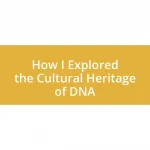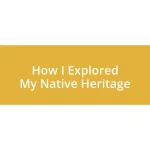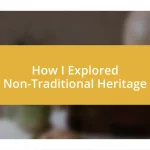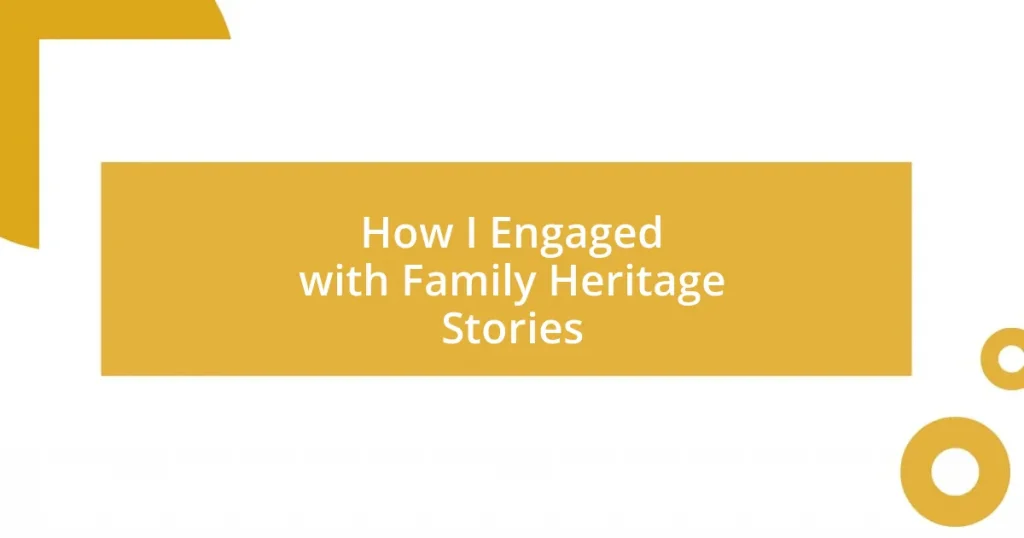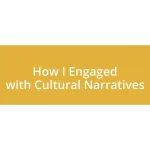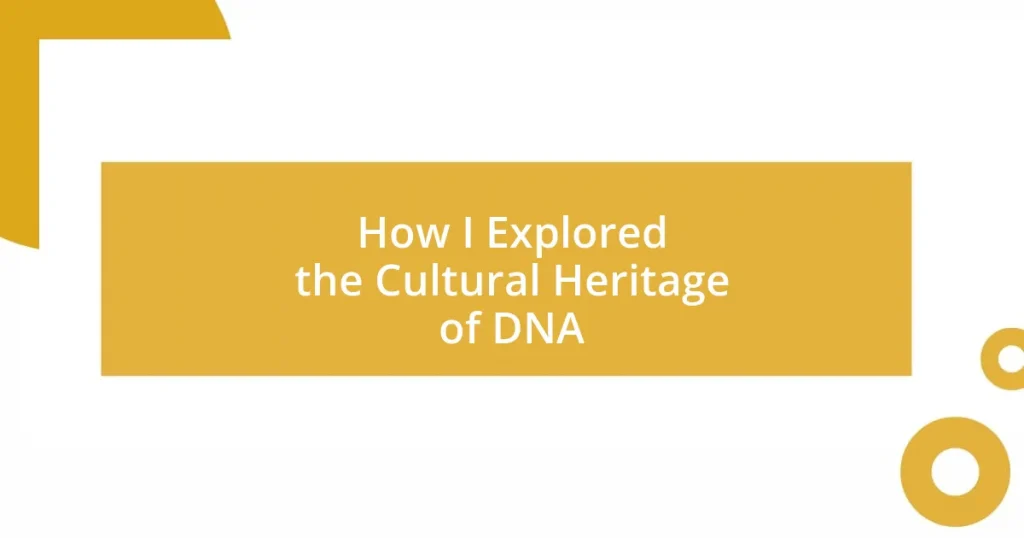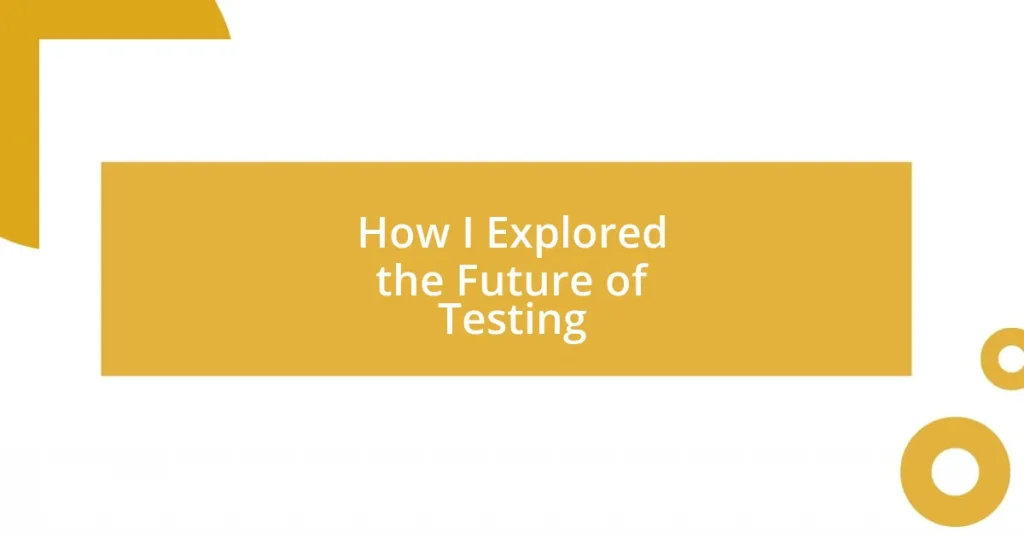Key takeaways:
- Family heritage stories foster a sense of belonging and shape personal identity by connecting individuals to their roots and shared experiences.
- Engaging with these narratives can empower individuals, encourage personal growth, and cultivate empathy by understanding diverse backgrounds.
- Utilizing techniques such as family interviews, storytelling nights, and documenting stories can effectively preserve and celebrate family history.
- Creating traditions around storytelling enhances familial connections and enriches the significance of gatherings and celebrations.
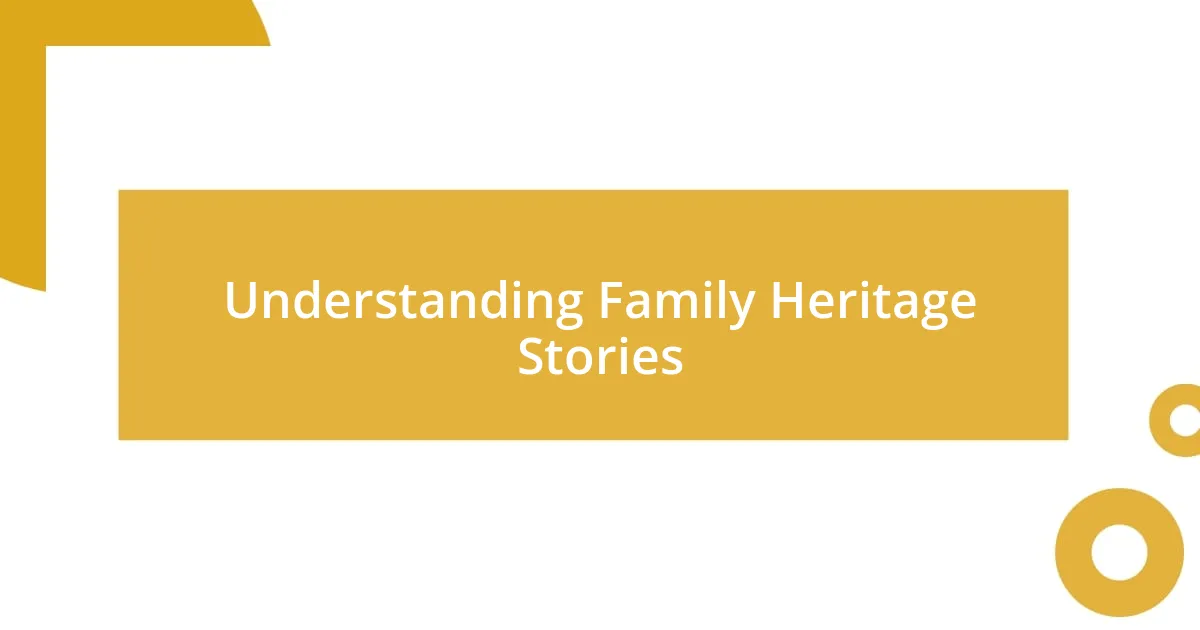
Understanding Family Heritage Stories
Family heritage stories are like precious artifacts, each carrying a unique blend of culture, tradition, and personal experience. I remember sitting with my grandmother, her hands gently weaving tales of her childhood in a small village. These stories seemed to create a bridge, connecting me to a time and place I had never known but felt profoundly intertwined with. Have you ever felt that sudden spark of recognition as someone recounts an experience that mirrors your own, even across generations?
Every family has its own narrative, shaped by the triumphs and struggles of the individuals who came before us. Reflecting on my own family’s journey, I realized that understanding these stories isn’t just about knowing the past—it’s about shaping our identity. It’s fascinating to think about how my great-grandfather’s immigration journey wasn’t merely a personal story; it offered insight into the resilience and determination that runs in our blood. How do your family’s tales resonate with your own life experiences?
Engaging with family heritage stories can be an emotional experience. When I stumbled upon my father’s old letters from his own father’s hometown, I felt a deep connection to my roots that I had previously overlooked. Those snippets of their lives gave me insight into their hopes, fears, and dreams, creating a poignant reminder that we are all shaped by the legacies we inherit. Do you have a keepsake or a story that has connected you to your lineage in this way?
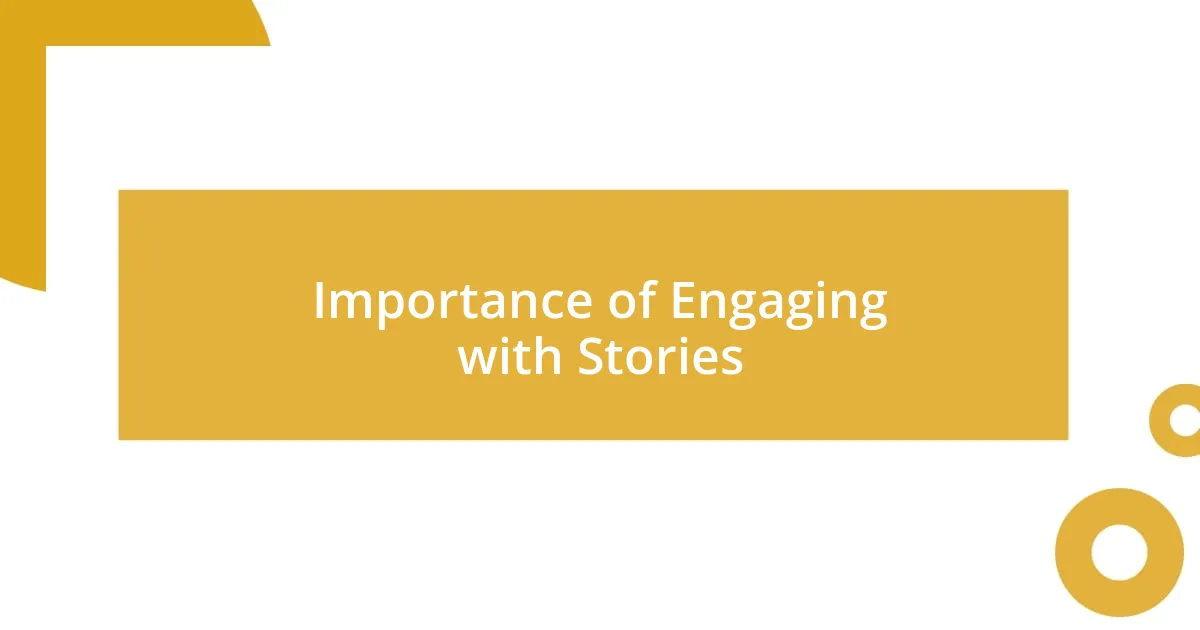
Importance of Engaging with Stories
Engaging with family stories creates a profound sense of belonging. I recall one evening when my uncle shared a humorous anecdote about my father’s childhood antics. As laughter echoed through the room, I felt a warmth that transcended generations—a reminder that these shared tales cultivate intimacy within our families. Isn’t it remarkable how a single story can stitch together the fabric of our relationships?
On a deeper level, these narratives serve as tools for personal growth. I discovered this when I learned about my aunt’s struggles during a challenging time in our family history. Her determination ignited something in me; it encouraged me to confront my own challenges with the same tenacity. The stories we inherit can empower us, giving us strength to persevere. Have you found inspiration in your family’s history?
Furthermore, engaging with these stories fosters empathy and understanding. When sharing my grandmother’s experiences during wartime, I noticed my friends, who came from different backgrounds, becoming engrossed in her journey. It opened a dialogue about our diverse histories. Hearing others’ perspectives invites us to appreciate the tapestry of human experience. How have your family’s stories shaped your interactions with others?
| Importance of Engaging with Stories | Benefits |
|---|---|
| Cultural Preservation | Stories help keep traditions alive for future generations. |
| Identity Formation | Engaging with stories aids in personal and cultural identity development. |
| Emotional Connection | Stories create bonds and foster intimacy within families. |
| Empowerment | Personal narratives can inspire strength and resilience. |
| Understanding Diversity | Sharing stories cultivates empathy and appreciation for different backgrounds. |
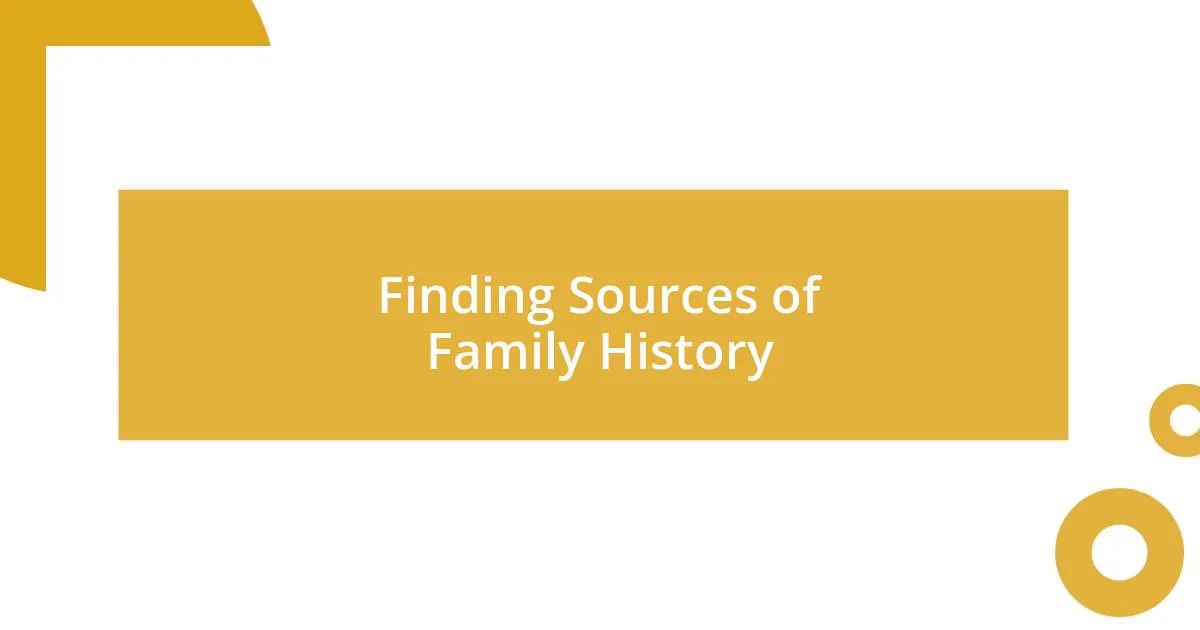
Finding Sources of Family History
Finding family history sources can be an enlightening journey. During my quest to uncover my roots, I attended a local genealogy workshop that transformed my understanding of what to look for. It was there that I learned about various types of sources, from census records to old photographs. Each found piece became not just a data point, but a gateway to my ancestors’ lives.
Here are some great sources I found valuable:
- Family Interviews: Conversations with relatives can yield stories and details not recorded anywhere else.
- Census Records: These documents provide a snapshot of family structures and movements throughout history.
- Church Records: Baptisms, marriages, and funerals often provide critical clues about family lineage.
- Military Records: They can reveal not only service details but personal stories of sacrifice and bravery.
- Old Letters and Diaries: These writings offer intimate glimpses into daily life and emotions from past generations.
- Local Libraries and Archives: Many have genealogy departments with resources specific to your area.
Each of these sources brought me closer to understanding the tapestry woven by my ancestors, enriching my perception of who I am today. I once stumbled upon a faded photo of my great-grandparents standing outside their first home, and it felt like I had connected with them in a way I had never anticipated. That moment sparked a desire to uncover the stories behind that image and discover the lives they led and the challenges they overcame. Anyone would feel moved upon realizing how tangible their family’s history can become.
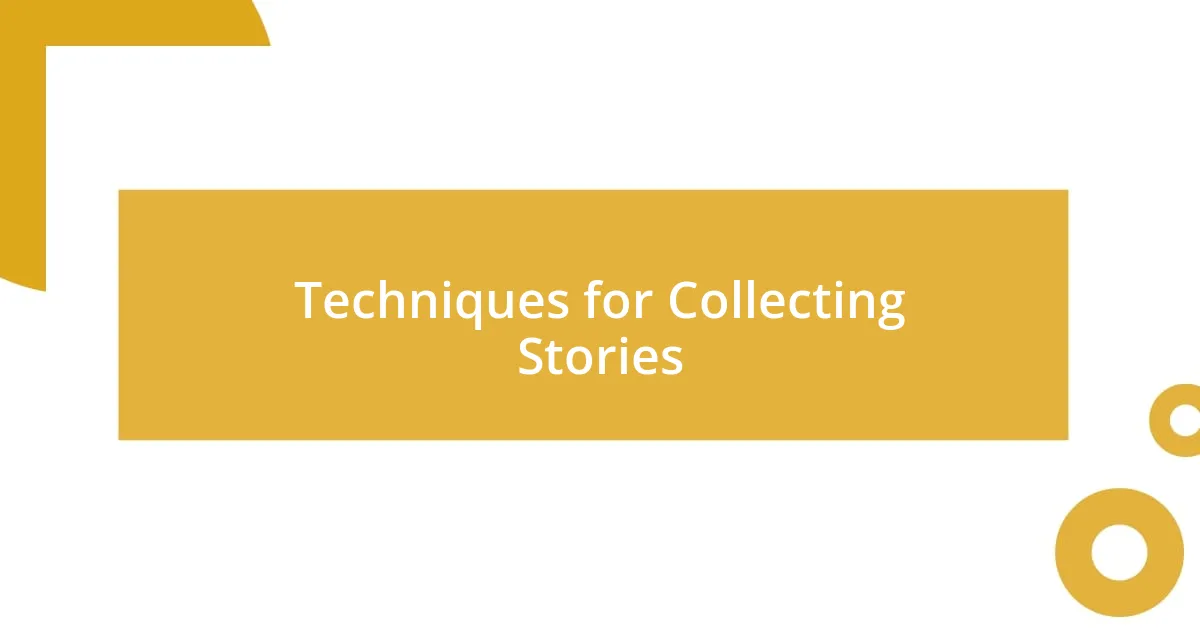
Techniques for Collecting Stories
When it comes to collecting family stories, I’ve found that a relaxed environment can work wonders. I remember sitting with my grandmother over a cup of tea, letting the conversation flow naturally. Just the right ambiance allowed her to open up about her youth, sharing memories that felt like hidden treasures. Have you tried this approach with your loved ones?
Another technique I’ve employed is utilizing prompts or questions to get the storytelling started. A simple inquiry like, “What was your childhood like?” can lead down unexpected and enriching paths. I once asked my father about a particular family gathering from his past, not expecting to hear tales of rivalry and laughter that changed my perspective on our family dynamics. Those questions often unlock layers of history that I never knew existed.
Lastly, I’ve learned the value of recording these sessions—whether it’s through voice memos, videos, or jotting down notes. It’s incredible to listen back and hear the nuances in their voices, the emotions they convey. One time, I recorded my aunt as she narrated a family legend. Hearing her voice crack with emotion when she recounted the struggles faced by our ancestors made the history come alive like never before. What recordings have you made that brought stories to life for you?
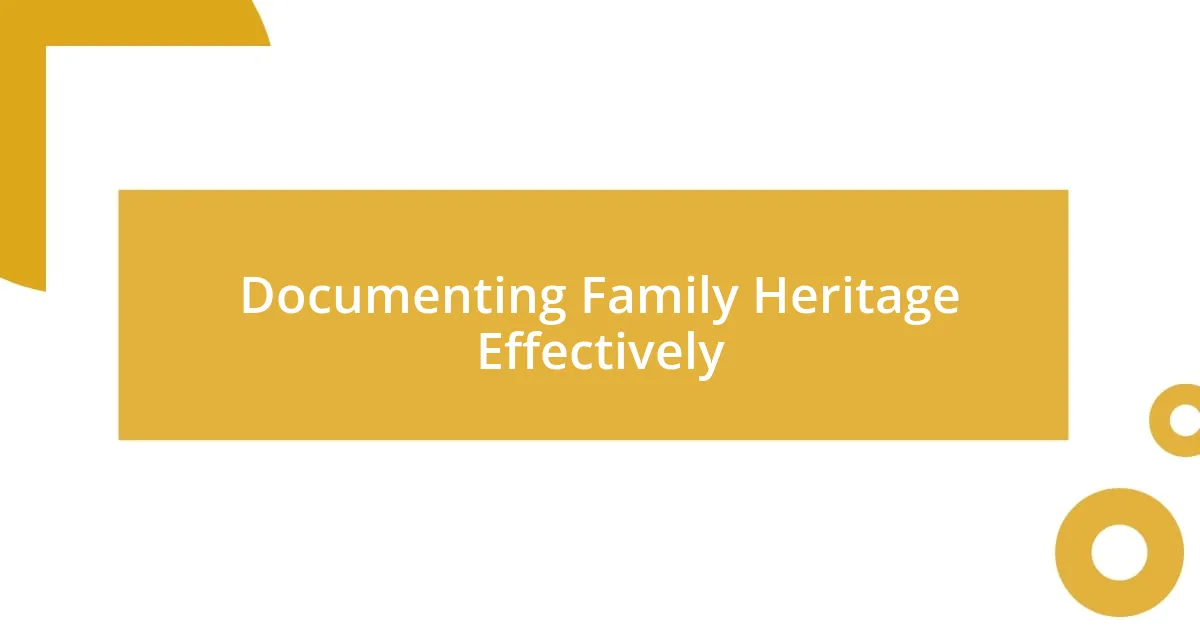
Documenting Family Heritage Effectively
When it comes to documenting family heritage effectively, I find that employing a combination of traditional and digital methods can make a significant difference. For instance, I began crafting a family tree on an online platform, which not only helps visualize connections but also served as a catalyst for conversations among relatives. Isn’t it fascinating how a simple diagram can lead to discussions about family secrets or stories we never knew existed?
In my experience, maintaining a journal dedicated to family stories has been incredibly rewarding. Each entry captures not just facts but the essence of shared experiences and emotions. I still recall writing down a story my uncle told me about our family’s immigration journey. The courage, fear, and hope he expressed were so vivid that it almost felt like I was walking alongside him through that chapter of our history. What stories would you preserve if you had the chance to document your family’s journey?
Lastly, I’ve found that sharing discoveries with family during gatherings can amplify the impact of our heritage stories. I remember hosting a small family reunion where we unveiled a scrapbook filled with old photos and notes I’d compiled over time. Watching the expressions on my relatives’ faces as they reminisced and added their insights transformed the experience into a shared celebration of our past. How might your family react to sparking similar conversations about your shared legacy?
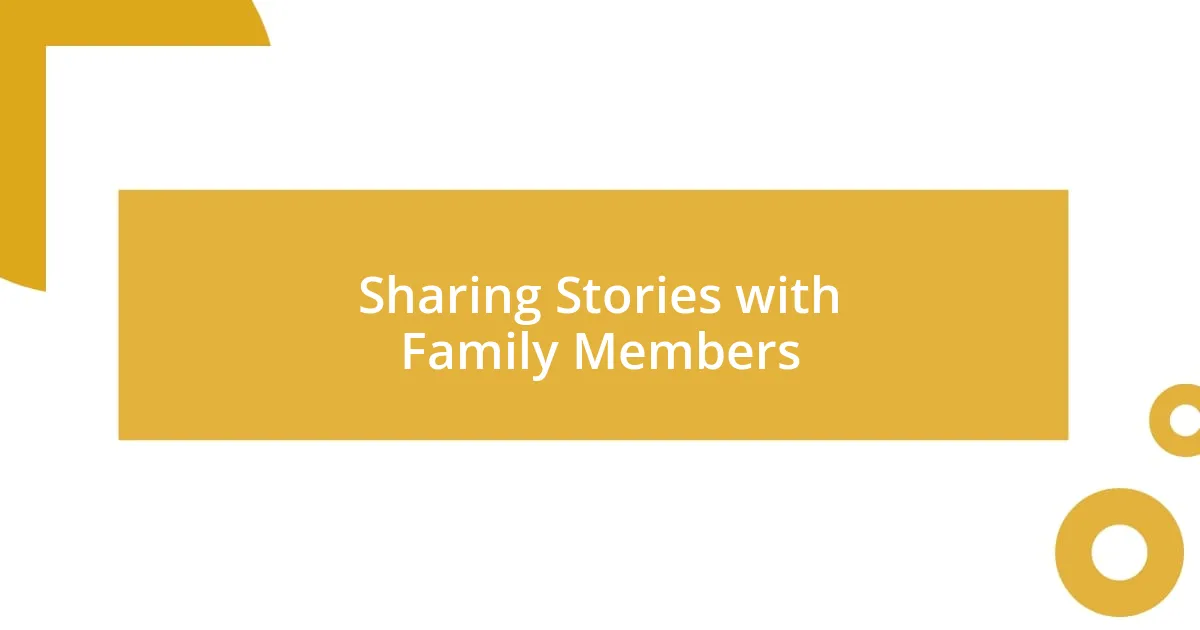
Sharing Stories with Family Members
Sharing stories with family members often hinges on the emotional connections we develop. I vividly remember a family dinner when my cousin began recounting a funny mishap from our childhood. Everyone’s laughter filled the room, but what struck me was how that simple story ignited memories in others too, prompting them to share their own tales. Isn’t it remarkable how one story can open the floodgates to a cascade of shared experiences?
Another experience that stands out is when I hosted a storytelling night in my living room. I invited family members to bring their favorite stories or even photos that had sentimental value. As we shared our narratives, a sense of belonging enveloped us, reminding me of the bonds we forge through our histories. Did you notice how, in moments like these, storytelling feels less like a presentation and more like a dance of voices?
Lastly, I believe that creating a safe space for sharing is pivotal. I often find that when conversations deepen, it’s essential to be attentive and empathetic—especially when a family member unveils a more emotional story. There was an occasion when my aunt spoke about her struggles after losing a loved one. The vulnerability in her storytelling resonated deeply with everyone, reinforcing our understanding of family support. Have you ever listened and felt the weight of a story so profoundly that it changed your view of those involved?
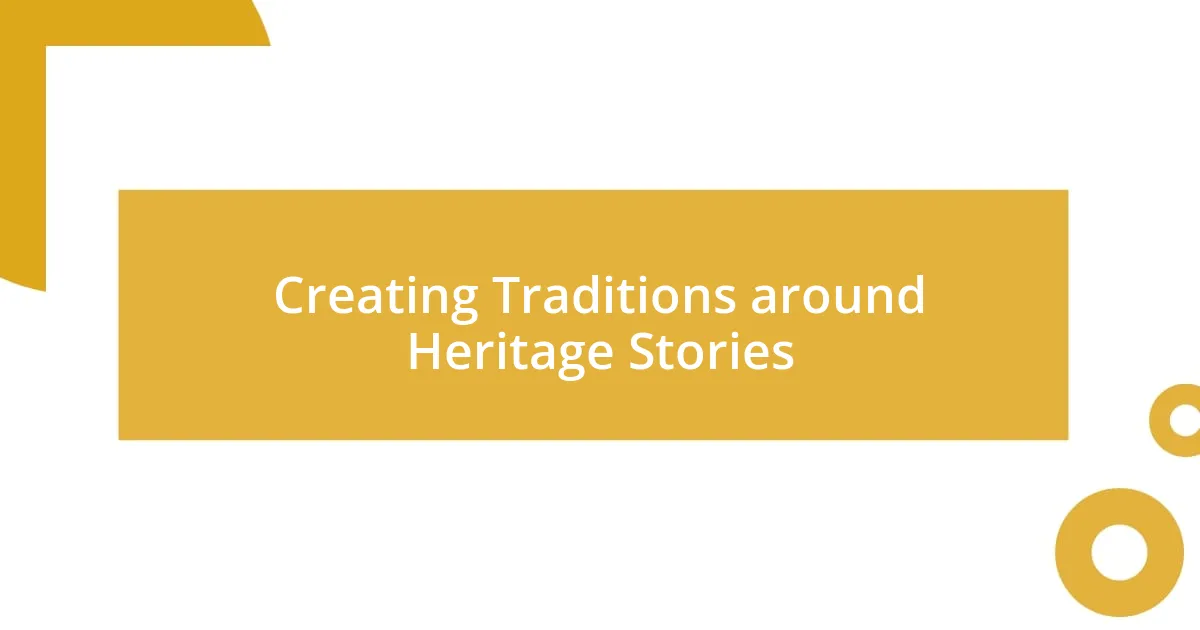
Creating Traditions around Heritage Stories
Creating traditions around heritage stories is something I’ve found to be deeply enriching. One year, I started the tradition of a “heritage night” during the holidays, where each family member shares a story from our past. I remember my grandmother speaking about her childhood in a small village. As she described the warmth of the community and the simple joys of life back then, I felt transported. Who wouldn’t want to share their roots in such a heartwarming way?
Another tradition I’ve embraced is the “Story Swap.” This informal gathering encourages family members to trade stories like treasures. I once swapped stories with my younger cousin, who shared a nearly forgotten tale of my late grandfather’s fishing adventures. His eyes sparkled as he recounted how they’d spend weekends by the river. It made me realize that these stories are bridges between generations. What memories might you uncover if you encouraged storytelling in your own family?
Additionally, I believe integrating heritage stories into family celebrations can enhance their significance. For instance, at my birthday, I made a point to include a toast dedicated to the stories that shaped our family. I shared the story of how my parents met, and that surprised many who had never heard it. The laughter and the shared pride in our lineage made the occasion even more special. Wouldn’t you agree that including these narratives transforms ordinary celebrations into rich, meaningful experiences?
